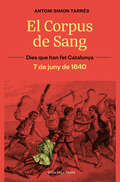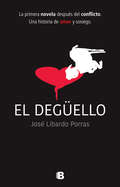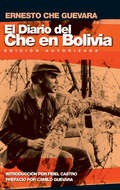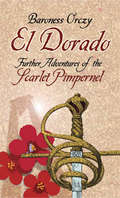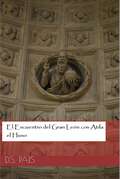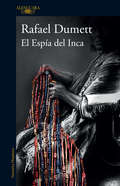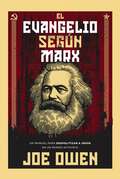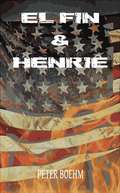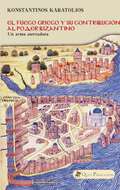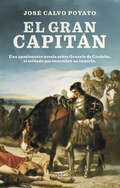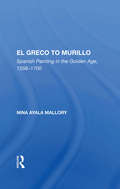- Table View
- List View
El Conde De Harrington
by Dawn BrowerJonas Parker, el conde de Harrington no tiene ningún deseo de casarse. Él prefiere no tener problemas y una esposa complicaría las cosas. El Wicked Earls 'Club es su refugio y no está listo para renunciar al matrimonio. Su abuelo, el duque de Southington, no quiere nada más que verlo casarse y volver al redil. Por esa sola razón, evitará las damas adecuadas y las campanas de boda. A Lady Marian Lindsay le gusta ser una solterona y abrazar sus maneras de bluestocking. Está estudiando para ser médica y quiere ser una doctora adecuada. Ella anhela ser tomada en serio en el campo de la medicina, pero sus esfuerzos pasan desapercibidos. Después de una cuidadosa deliberación, concibe un plan que es infalible, pero necesita la ayuda de uno de los amigos de su padre para que esto suceda. Harrington está horrorizado por la solicitud de Marian y se niega rotundamente; sin embargo, de alguna manera logra convencerlo para que diga que sí. Antes de que se dé cuenta, la está acompañando a Kent y una fiesta en la casa hecha de sus peores pesadillas. La propiedad debe cumplirse a toda costa, porque él no se casará al final de su expedición, ¿o no?
El Conde de Latón
by Kara Jorgensen Camila JaraCuando Eilian Sorrell, un arqueólogo prometedor y el hijo mayor del conde de Dorset, pierde su brazo en un accidente de dirigible, teme enfrentar un futuro sombrío entre la aristocracia londinense. En su búsqueda por alcanzar la normalidad, lord Sorrell encarga un brazo prostético pero descubre que el artesano no es lo que parece. Después de la muerte de su hermano, Hadley Fenice queda a cargo de su negocio de prótesis, pero sabe que será una batalla difícil pues se desalienta a las mujeres a hacer el trabajo de un hombre. A cambio de construir un brazo eléctrico a lord Sorrell, él le ofrece que lo acompañe al desierto Néguev disfrazada de hombre como una oportunidad de libertad. Sin embargo, lo que se extiende bajo el desierto es más precioso que los fragmentos de vasijas o los huesos. Conforme se aventuran más adentro, descubren una sociedad donde la ganancia no es lo que controla el camino de la vida, sino que la pasión. Cuando los invasores imperialistas van en la búsqueda de una nueva colonia para arrasarla, Eilian y Hadley se ven forzados a defender su fugaz destello del paraíso.
El Conde de la Persuasión: El Club de los Condes Malvados (Colección/Series: Club de los Condes Malvados #3)
by Amanda MarielEL Señor Brian Kennington. Quinto Conde de Connlee, es un maestro de la persuasión. Cuando se cruza su camino con el de la no tan propia Señorita Minerva Fox, él determina que ella necesita un poco de emoción en su vida, y él justamente sabe cómo proporcionársela. Él vivirá a la altura de su apodo, el Conde de la Persuasión, mientras la lleva por un camino de aventura y romance. El único problema con su plan: El amor no formaba parte de la ecuación.
El Corazón de las Highlands: El Cuervo (Los Protectores de la Corona #1)
by April HolthausObligada a casarse con un despiadado Lord inglés, Adelyn Scott prefirió la muerte al matrimonio, pero no tenía ni idea de que su deseo se haría realidad hasta que descubrió el cuerpo de su marido yaciendo muerto en su habitación la noche de su boda. Como comandante de la guardia personal del rey, la lealtad de Eamon MacLeish nunca ha sido cuestionada. Hasta el día en que una misteriosa mujer llegó buscando asilo y le robó el corazón. Mientras Adelyn y Eamon reconstruyen las pistas que rodean el asesinato de su marido, Eamon debe elegir entre su lealtad o su corazón. Porque un camino llevaría finalmente a la muerte de ella, y el otro a la de él.
El Corpus de Sang: 7 de juny de 1640
by Antoni SimónEl relat viu i sagnant de la revolta que va desembocar en la ruptura entre Catalunya i la monarquia espanyola. El dia 7 de juny de 1640 un gran avalot protagonitzat per una massa de segadors entrats a Barcelona, així com per nombrosos membres de les capes populars de la capital catalana, va acabar amb la vida de Dalmau de Queralt, comte de Santa Coloma i virrei de Catalunya. Les ja molt tenses relacions entre les institucions catalanes i la Cort de Madrid entraren des de llavors en un punt de fissió de no retorn, tot desembocant en un procés revolucionari que portaria a la separació de Catalunya de la monarquia espanyola. L'eminent historiador Antoni Simon ens ofereix un relat viu i detallista d'aquells dies de revolta que van culminar amb l'assenyalada diada del Corpus de Sang, tot donant veu als nombrosos coetanis -pagesos, menestrals, jutges, nobles, eclesiàstics- que a través dels seusdietaris personals i epistolaris van deixar un testimoniatge directe d'un dels episodis més notoris de la Història de Catalunya.
El Degüello
by Jose Libardo Porras VallejoUna historia de amor durante el posconflicto. Anhela, una enfermera bogotana, y Pablo, un economista medellinense, coinciden en Mocoa para trabajar en Puerto Asís con un Programa de sustitución de cultivos ilícitos. En una sobria e inteligente narración el autor nos devela el choque entre dos mundos: el selvático y el urbano. Novela iniciática, pero también una historia de amor y sosiego. El amor crece y también la perplejidad de Pablo en un universo áspero y extraño. La vida marcha en su cauce normal hasta que una celebración le da un giro inusitado. Una tragedia interior nos hace pensar sobre cuál es la misión de cada uno en tiempos de transición e incertidumbre. Entre la ficción y la realidad El degüello explora sentimientos en territorios movedizos e inéditos.
El Diario del Che en Bolivia
by Ernesto Che Guevara Fidel Castro Camilo GuevaraChe's diary of the fateful Bolivia mission. Now revised by Che's widow and with a preface by his son Camilo, this is the definitive account of the attempt to spark a continent-wide revolution in Latin America--the basis of Steven Soderbergh biopic on Che Guevara starring Benicio Del Toro.
El Diario del Che en Bolivia (The Che Guevara Library)
by Ernesto Che Guevara"He llegado a los 39 y se acerca inexorablemente una edad que da que pensar sobre mi futuro guerrillero; por ahora estoy 'entero'."—Che Guevara, 14 de junio de 1967Esta nueva edición del diario del que sería el último año del Che Guevara, detalla los esfuerzos del Che por dar inicio a una insurrección guerrillera contra el gobierno militar de Bolivia. El diario fue hallado en su mochila al ser capturado por el ejército boliviano en octubre de 1967. Esta nueva revisión incluye el texto de Fidel Castro &“Una introducción necesaria&”, en el que saca a la luz las mentiras incluidas en una edición anterior preparada por la CIA, con el objetivo de desacreditar al Che, la expedición boliviana y a la revolución cubana misma. El Diario de Che en Bolivia nos revela a un Che más viejo, más experimentado, con su salud mermada, distinto al juvenil y exuberante del Diario de Motocicleta escrito quince años antes, o del implacable y maduro Pasajes de la Guerra Revolucionaria: Congo, de apenas dos años antes. Aquí habla con punzante ironía al narrar los desafíos cotidianos encarados por su pequeño grupo guerrillero, los pronunciamientos del gobierno militar, así como las acciones de la enorme fuerza militar que los atacaba. La última anotación describe el día previo a la captura del Che, apenas dos días antes de su muerte.
El Dios De Abraham, Isaac Y Jacob
by Gabriel AgboLas promesas del pacto de Dios no fallan. Este libro pretende ayudarles a alcanzar todas las promesas de Dios para su vida. Se trata de un estudio cuidadoso y elaborado, que contiene testimonios personales, sobre la habilidad y voluntad de Dios de cumplir su Palabra hacia nosotros. Él dijo que está atento a que se cumplan sus palabras. Aquí, analizaremos críticamente la dinámica de una promesa divina; cómo se estableció, se mantiene y se cumple. Cada pacto tiene su principio, tiempo y condiciones. Debemos saber esto para que podamos ajustarnos a la voluntad de Dios para nuestra vida de una manera perfecta y cómoda. En realidad, ¡todas las cosas son posibles con Dios!
El Dorado
by Emmauska OrczyBaroness Emma Magdolna Rozália Mária Jozefa Borbála "Emmuska" Orczy de Orczi (23 September 1865 - 12 November 1947) was a Hungarian-born British novelist, playwright and artist of noble origin. She is most known for her series of novels featuring the Scarlet Pimpernel. This is one of her novels.
El Dorado: Further Adventures of the Scarlet Pimpernel
by Baroness OrczyThe elusive Pimpernel returns for another swashbuckling adventure in El Dorado. The still-raging French Revolution continues to claim lives, and the shadow of the guillotine draws ever nearer to the young Dauphin, son of Louis XVI and Marie Antoinette. No one dares to attempt to liberate the little prince — no one, that is, but the mysterious Sir Percy Blakeney, also known as the Scarlet Pimpernel. Sir Percy takes on one of Robespierre's agents, the scheming Citizen Chauvelin, in a suspenseful blend of action and political intrigue, recounted with captivating period detail. Unabridged republication of the classic 1913 edition.
El Duque del Pecado: Julieta no está preparada para que el Duque del Pecado se interese por ella. Él amenaza sus planes.
by Dawn BrowerLa señorita Juliet Adams viviría en la calle si no fuera por la amabilidad de la condesa viuda de Wyndam. Su padre murió dejándola sin un centavo y sin perspectivas. La condesa le ofreció un puesto como su acompañante y ella aprovechó la oportunidad. Está contenta con su vida, pero tampoco es tonta. Es plenamente consciente de que puede llegar un día en que no cuente con la protección de la condesa y, entonces, ¿dónde quedará ella? Así que ha hecho planes, concesiones, ninguna de las cuales incluye el amor o el matrimonio. Hasta que cierto duque la hace cuestionarse todo... Gideon Pryce, el duque de Sinbrough, ha llevado una vida llena de las actividades más pecaminosas imaginables. No hay mucho que no haya hecho o que se plantearía hacer. Vive para toda la decadencia que pueda permitirse y, por lo que a él respecta, no hay suficiente en el mundo. Hasta que un día se fija en ella. La única mujer que le mira como si no fuera nada. Por lo general, las mujeres se pelean por estar con él, pero no la señorita Juliet Adams. Decide que su misión es cambiar la imagen que ella tiene de él y, tal vez, demostrarle cuánto placer puede darle. Juliet no está preparada para que el mismísimo Duque del Pecado se interese por ella. Pone en peligro todos sus planes y podría ser su perdición. Eso si ella no puede ser su salvación...
El Encuentro del Gran León con Atila el Huno
by D. S. PaisResumen Atila, el rey de los hunos, está empeñado en destruir Roma. Hay una persona que el rey de Italia cree que puede enfrentarse a él: León el Grande. Cuando León se encuentra con Atila, queda hipnotizado por las palabras de León. ¿Las palabras tienen un impacto en Atila para evitar la destrucción de Roma y su gente o será la causa de la guerra?
El Escándalo de la Solitaria
by Amanda MarielDos personas unidas a través de una circunstancia no deseada descubren algo que ninguno de los dos creía haber tenido jamás. Una tímida por naturaleza, Jane aceptó hace mucho tiempo que se convertiría en una solterona. Tal vez ese destino fue lo mejor. Después de todo, ella había sido testigo de primera mano de lo miserable que podía ser el matrimonio para una dama. Sin embargo, se atrevió a soñar, es decir, hasta que se encuentra totalmente escandalizada por un señor con los modales de un jabalí. Después de que Caleb Wesley, Lord Keery, no protegió a la única persona que había contado con él, aceptó su papel de canalla. Mantiene sus vicios cerca de las faldas, el juego y el licor, y no tiene intención de renunciar a ellos. Incluso después de que accidentalmente arruina a una dama y se ve obligado a ofrecer matrimonio. Dos personas unidas a través de una circunstancia no deseada descubren algo que ninguno de los dos creía haber tenido jamás. ¿Pueden dejar de lado sus viejas heridas y creencias el tiempo suficiente para aceptar el regalo que el destino les ha otorgado?
El Espía del Inca
by Rafael Dumett“Si los peruanos debiéramos leer una sola novela publicada en estas dos últimas décadas sería esta” Alberto Vergara"Rafael Dumett potencia majestuosamente el espionaje anudando una de las novelas históricas más admirables de las letras peruanas y, en general, hispanoamericanas". Ricardo González Vigil El Inca Atahualpa, Señor del Principio, ha sido capturado por unos extraños barbudos que han llegado hasta Cajamarca montados en llamas gigantes y premunidos de mortales cilindros en los que habita Illapa, el dios del Trueno y el Relámpago. El Mundo de las Cuatro Direcciones se encuentra en peligro mortal. La misión de rescatar al Inca recae en Salango, un espía chanca del servicio secreto del incario, Contador-de-un-Vistazo, tejedor de quipus y protagonista de esta monumental novela. Pero sus casi mil páginas no se sostienen solo en esta única tarea, sino también en la minuciosa reconstrucción de una civilización portentosa y singular, la incaica, en que colisionan las lealtades y bullen la codicia, la traición y la ambición de poder. Poco tiempo después de su primera publicación, El Espía del Inca se convirtió, según la crítica especializada, en la mejor novela de lo que va del nuevo siglo. Por un lado, recrea, con sólida documentación histórica pero con las licencias de la ficción novelística, el infructuoso rescate del Inca. Por otro, da nueva vida a los personajes que poblaron nuestros territorios en los instantes primeros de nuestra nación, de nuestras naciones.
El Evangelio Puro: La profunda simplicidad de la Palabra
by Danilo H. GomesLa profunda sencillez de la palabra Resumen del evangelio sin complementos humanos. el evangelio puro ¿Realmente conoces el evangelio o solo lo que te han dicho? ¿Te dijeron toda la verdad? Hoy tenemos una cantidad sorprendente de personas que se clasifican como cristianos, pero por otro lado, estas mismas personas defienden ideas absurdas, totalmente antibíblicas, porque escucharon el evangelio sin consultar la fuente original: la Santa Biblia. ¿Serías una de estas personas? ¿Está seguro? Necesitamos urgentemente volver al evangelio puro, sin añadidos humanos. EL EVANGELIO PURO trae un panorama del evangelio totalmente basado en las Sagradas Escrituras, sin ningún complemento dudoso o cuestionable, para reenraizar al cristiano en la fuente de la sabiduría. Narra la trayectoria del hombre caído hacia Cristo, siempre basado en lo que dice la Biblia, letra por letra. Conozca el evangelio de una manera que quizás nunca haya conocido, desde la creación hasta la salvación y las obligaciones cristianas. > Más información sobre: La creación, la historia del hombre, el pecado, la ley de Dios, el sacrificio de Jesús, entre otros temas. Género: RELIGIÓN / Estudios Bíblicos / General
El Evangelio de Simon
by John SmelcerHace 2.000 años un predicador llamado Jesús fue condenado a la crucifixión. Un hombre llamado Simón, de Cirene, se vio obligado a ayudar a Jesús a llevar la cruz pesada. El encuentro cambió su vida. Desde entonces, sus descendientes han salvaguardado un secreto increíble.
El Evangelio según Marx: Un manual para despolitizar a Jesús en un mundo activista
by Joe OwenDescubre cómo discernir entre la verdad bíblica y las ideologías culturales que están infiltrando la iglesia, para que puedas vivir tu fe con claridad y convicción en medio de un mundo confuso y politizado.En el siglo veinte, dos ideas opuestas destacaban en Occidente: las enseñanzas de Jesucristo y la versión de una utopía inspirada por Karl Marx. Ahora, en el siglo veintiuno, estas ideas están extrañamente mezcladas tanto en la cultura como dentro de la Iglesia.El autor Joe Owen entrega un examen oportuno de cómo el pensamiento marxista ha infiltrado las comunidades de fe modernas. Este manual integral te equipa para reconocer y responder a las maneras sutiles en que las cosmovisiones seculares desafían los fundamentos bíblicos.Lo que descubrirás:Herramientas prácticas para pastores, líderes y creyentes navegando las presiones culturalesRespuestas bíblicas a la teoría crítica de la raza, ideología de género y movimientos de justicia socialFundamentos teológicos para entender la naturaleza humana, el pecado y la redención por medio de CristoLas raíces históricas de cómo la ideología marxista evolucionó de teoría económica a revolución cultural¿Listo para reclamar la verdad bíblica?Transforma tu comprensión de cómo vivir fielmente en un mundo cegado por las tinieblas. Redescubre el poder radical del cristianismo auténtico que trasciende las ideologías humanas.Disponible en formato de tapa blanda, libro electrónico y audiolibro para tu conveniencia. The Gospel According to MarxDiscover how to discern between biblical truth and cultural ideologies that are infiltrating the church, so that you can live your faith with clarity and conviction in the midst of a confusing and politicized world.In the twentieth century, two opposing ideas stood out in the West: the teachings of Jesus Christ and Karl Marx's version of utopia. Now, in the twenty-first century, these ideas are strangely mixed both in culture and within the Church.Author Joe Owen provides a timely examination of how Marxist thinking has infiltrated modern faith communities. This comprehensive handbook equips you to recognize and respond to the subtle ways in which secular worldviews challenge biblical foundations.What you will discover:Practical tools for pastors, leaders, and believers navigating cultural pressuresBiblical responses to critical race theory, gender ideology, and social justice movementsTheological foundations for understanding human nature, sin, and redemption through ChristThe historical roots of how Marxist ideology evolved from economic theory to cultural revolutionReady to claim biblical truth?Transform your understanding of how to live faithfully in a world blinded by darkness. Rediscover the radical power of authentic Christianity that transcends human ideologies.Available in paperback, e-book, and audiobook formats for your convenience.
El Fin & Henrie
by Peter BoehmHenrie es una joven de 21 años quien, a muy temprana edad, perdió a su padre en un accidente de aviación. Él había sido un diplomático alemán. El avión y su cadáver jamás fueron encontrados. Un día después de la caída del avión explosonió una Bomba Sucia. Este atentado desencadenó la Guerra Global. La madre estadounidense de Henrie nunca superó la trágica muerte de su esposo. Tampoco Henrie pudo sobreponerse a este suceso. El hecho que su padre había desaparecido en misteriosas circunstancias arrojó oscuras sombras sobre su vida… Es el año 2022. La Guerra Global llegó a su fin. Estados Unidos fue derrotado. Henrie está como voluntaria en el Programa Internacional de Amistad. El mundo se unió en contra de la antigua superpotencia y como castigo creó este Programa. Todos los jóvenes estadounidenses entre los 19 y 22 años de edad tienen que trabajar duro en el tercer mundo. Cada par de días se envía a Henrie a algún país de la Tierra. Henrie vuelve, por primera vez después de tres años, a su ciudad natal en los Estados Unidos. Se junta con el nuevo voluntario Gabe y se enamora de él. Por tro lado, el jefe del Programa de Amistad, Christian Opitz, quién se deja celebrar como una estrella de Rock, se mete en su vida. Las interrogantes son -¿Gabe está verdaderamente de su lado? ¿Qué quiere Opitz de ella realmente? Los sucesos se agravan y el abismo entre la vida cosmoplolita de Henrie y la lealtad a su patria parecen despedazarla. Tiene que tomar una decisión de enorme trascendencia… „Henrie piensa, en este único valioso momento, tan efimero que es, el momento, ¿quién lo podría retener?, ellos dos de la mano sobre la Nada, ella mira hacia el mundo de juguetes que está abajo y piensa: Mundo, tan apacible que eres desde la distancia y tan peligroso cuando se está dentro de ti.“
El Frente Interno de Hitler: La Vida en la Alemania Nazi Durante la Segunda Guerra Mundial
by Nathan MorleyEl libro trata sobre las vivencias del frente interno de Hitler durante la Segund Guerra Mundial. Esta historia, dentro de lo posible, está organizada cronológicamente, por incidente y observación, comenzando a finales de 1939. Ciertamente, no es un estudio exhaustivo, pero he intentado capturar la naturaleza de la experiencia del frente interno, sus crueldades y sinsentidos, a través de las personas que lo vivieron como los soldados, esposas, líderes de partidos, niños, prisioneros, trabajadores forzados y periodistas. En un espacio de tan solo catorce años, los Nazis – quienes comenzaron como un grupo de fanáticos descontentos en Bavaria – fueron capaces de construir una gran maquinaria política y convertirse en el único instrumento de estado, apuñaleando la democracia parlamentaria y estableciendo la dictadura más brutal jamás conocida. Para el momento cuando explotó la guerra, ya habían penetrado cada fase de la vida social e individual del país. Con la guerra, la familia alemana sufrió un estallido detrás de otro – movilizaciones para trabajar, enfrentamientos, racionamiento, así como un terrible declive en la calidad de vida y la salud. El horror más visible fue el bombardeo intensivo de las ciudades, con la destrucción de casas y propiedades privadas, dándole la forma de una guerra totalitaria. Al principio del conflicto, los niños fueron evacuados, los esposos fueron reclutados y los hogares completamente devastados. Las mujeres les temían a las bajas en los hogares y en el frente; los soldados se preocupaban por la inseguridad física de sus familias en sus casas, mientras que las mujeres más jóvenes enfrentaron un futuro como viudas de guerra o solteras. Los Nazis se prepararon para las dificultades en el frente interno lo mejor que pudieron, pero mientras la guerra se extendía, la magnitud de la situación que los alemanes aguantaron se deterioró más allá de cualquier
El Fuego Griego y su contribución al poder bizantino
by E2e Konstantinos KaratoliosUna maravilla como el Imperio Bizantino de los mil años no podría haber sido lograda sin sus fuerzas armadas, que le permitieron mantener su poder frente a los constantes retos que le presentaban enemigos externos de naturalezas significativamente diferentes. En un contexto así, lo heredado de los romanos era tan importante como la adopción de nuevas armas y tácticas de batalla. El Fuego Griego, pese a no ser la más importante arma, era ciertamente la que más fama cosechó. Fue utilizada en todo el imperio ayudando a conseguir espectaculares victorias a su marina. Este arma aterradora marcó época, y pese a ello todo lo que sabemos sobre su historia se encuentra difuminado por la vaguedad de los escritos contemporáneos. En este trabajo, Konstantinos Karatolios trata de responder una serie de preguntas relacionadas con el Fuego Griego: ¿Cuál era la fórmula? ¿Qué efectividad poseía? ¿Quién es su verdadero creador? ¿Cómo se utilizaba en batallas de tierra y mar? Este libro trata de no solo ofrecer una visión breve y global sobre el estado actual de las investigaciones que puede ser fácilmente leída por no especialistas, haciendo al mismo tiempo una contribución a su estudio respetando los métodos de investigación académicos.
El Fuego de Scotia
by Tanya Anne CrosbyEscocia, 1125, empieza la leyenda... El clan de Aidan dún Scoti lleva dos siglos guardando el mayor secreto de Escocia, a la espera de que aparezca un digno sucesor que consiga unir a los clanes de las Highlands. Su pueblo es el último que queda en pie de los Pintados, los guardianes de la verdadera Piedra del Destino. Una lucha por el poder. Las tribus de las Highlands se encuentran divididas. El rey David de Escocia ansía una alianza con los fieros montañeses. Pero solo una mujer tentará a Aidan dún Scoti: la belleza maldita cuyo padre una vez traicionó a su clan... Sed de venganza. Lìleas MacLaren, objeto de una maldición impuesta por el pueblo de Aidan debido a los pecados de su padre, es la mujer en cuestión a la que él cree ser inmune. David de Escocia se la ofrece en matrimonio como una aparente ofrenda de paz y es, además, la única mujer capaz de doblegar al feroz terrateniente. Profuso en historia y tradiciones, HIGHLAND FIRE: los guardianes de la Piedra recupera a los personajes favoritos de Las Novias de las Tierras Altas y te presenta a otros nuevos.
El Gran Amorío de Lady Parker: Una novela de escándalo en Surrey (Scandal in Surrey, older characters, scandal, sexy, Regency, Sandra Sookoo, #1)
by Sandra SookooElla quiere una aventura... Maggie, Lady Parker, desea un hombre, pero no está dispuesta a dejar la libertad en Surrey para buscar un escándalo en Londres. Viuda durante años, quiere provocar un escándalo lo suficientemente grande como para que un caballero acuda a ella simplemente para ver si los rumores sobre ella son ciertos. Él quiere una oportunidad en el Parlamento... Stephen Tarkington es un pícaro autoproclamado, pero si se saliera con la suya, sería un filántropo. Lo único que impide su sueño es su falta de patrocinio para ontener un puesto en el Parlamento. Casarse con la sobrina de Lady Parker podría resolver su problema. A veces, el corazón quiere más... Imaginen su sorpresa cuando conoce a la viuda y ella no es un pájaro viejo al que él pueda encantar. Ella es vibrante, de lengua afilada y encantadora para empezar. La pasión arde entre ellos, y Stephen abandona su plan... en busca de una apuesta más placentera. Maggie se siente atraída de inmediato por el encantador y guapo caballero, pero ¿satisfará sus necesidades un simple amorío? Un roce con el escándalo público los arrojará a una situación que podría satisfacer los deseos secretos de ambos.
El Gran Capitán: Una apasionante novela sobre Gonzalo de Córdoba, el soldado que encumbró un imperio
by José Calvo PoyatoCon su maestría de narrador y sus profundos conocimientos de historiador, José Calvo Poyato nos introduce en la vida del soldado español más insigne de todos los tiempos: Gonzalo Fernández de Córdoba, el Gran Capitán. Tras su paso por la guerra de Granada y las famosas campañas de Italia, que le valen el sobrenombre de «Gran Capitán», Gonzalo de Córdoba se ve postergado por Fernando el Católico. Su popularidad, que el monarca percibe como una amenaza, lleva al rey a alejarlo de la corte y enviarlo como alcaide a Loja, en un destierro encubierto. Mientras Gonzalo vive ese «destierro», tiene lugar la batalla de Rávena entre los ejércitos de Francia y la Liga Santa, formada por España, el papado y Venecia. La victoria francesa causa estupor en la corte y los aliados de don Fernando reclaman la presencia del Gran Capitán en Italia. El rey se ve obligado a ordenar a Gonzalo que ponga en pie un ejército. La que puede ser laúltima campaña de este ilustre personaje sirve como marco para que José Calvo Poyato, uno de los referentes de nuestra novela histórica, relate la trepidante vida de un hombre, ejemplo de lealtad y excepcionalmente dotado para la milicia, que consiguió romper con la tradición bélica medieval y hacerse, por méritos propios, con un lugar de honor en la historia de España. Reseña:«Con su maestría de narrador y sus conocimientos de historiador, aunando lo mejor de ambos mundos, José Calvo Poyato nos introduce en la vida de uno de nuestros personajes más célebres.»Qué Leer
El Greco To Murillo: Spanish Painting In The Golden Age, 1556-1700
by Nina A. MalloryA study of the art and artists of seventeenth-century Spain examines historical, religious, cultural, and political influences. Including entries on the School of Madrid, Baroque painting of Seville and artists; El Greco, Luis Tristan, Juan Sanchez Cotan, Pedro Orrente, Juan Bautista Mayno, Juan van der Hamen, and Vicencio Carducho.




